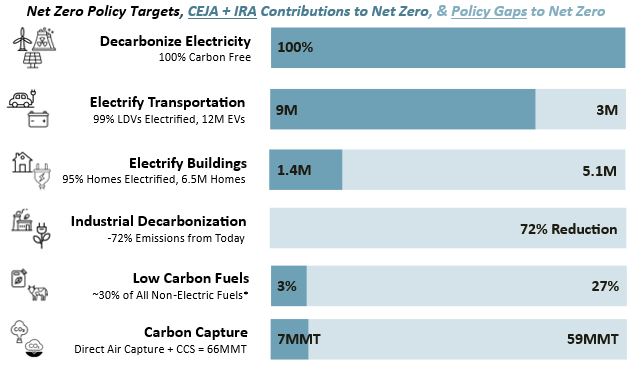
In the past few years, the State of Illinois has made two major commitments to decarbonizing its economy, first joining the U.S. Climate Alliance (USCA) in 2019 and then, in 2021, passing the Climate and Equitable Jobs Act (CEJA). Together, these two steps set Illinois on a path to decarbonization and commit the state to phasing out fossil fuels in the power sector, electrifying transportation, and moving toward a 100% clean energy goal. In a new report, E3 worked with Commonwealth Edison (ComEd), Illinois’ largest utility to develop scenarios that identify measures necessary to achieve USCA and CEJA goals. While Illinois will make significant progress toward decarbonization under existing policies, including both CEJA and the federal Inflation Reduction ACT (IRA), E3 found policy gaps where additional policy will be needed to achieve net zero by 2050, especially to address emissions from buildings, heavy-duty transportation, industry, and agriculture.

To determine the impact that CEJA and the IRA will have on GHG emissions in Illinois and to identify additional measures needed to achieve net-zero, E3 worked with ComEd and a technical advisory committee (TAC) to develop three scenarios. Those scenarios included a business-as-usual scenario, a Moderate Electrification scenario, and a High Electrification scenario. E3 used several of our in-house models to conduct this analysis including our economy-wide GHG scenario PATHWAYS model, our Hourly Load Impact tools, our least-cost electric portfolio optimization model RESOLVE, and finally our Customer Energy Affordability tool to leverage all the information from prior modeling steps to assess the impacts of the decarbonization scenarios on representative residential customers.
E3’s analysis found several commonalities among the scenarios for achieving net-zero GHGs in Illinois by 2050. Electrification and clean electricity are the key drivers of decarbonization. Renewable fuels play an important role in both net-zero scenarios, but that role is secondary, though complementary to electrification efforts. Because of Illinois’ large industrial and agricultural sectors, parts of the economy that are hard to decarbonize, negative emissions technologies are necessary to reach net zero. While CEJA and the IRA, along with the state’s USCA pledge, have kick-started Illinois’ transition to net-zero, Illinois will still need to implement additional policy to accelerate decarbonization to make its net-zero by 2050 goal a reality.
The final report can be accessed on E3’s website. E3’s Amber Mahone, Dan Aas, Jessie Knapstein, Rawley Loken, Dr. Mengyao Yuan, Charlie Duff, Ruoshui Li, Stephanie Kinser, Liz Wilson, and Hayden Dahmm contributed to the analysis.


